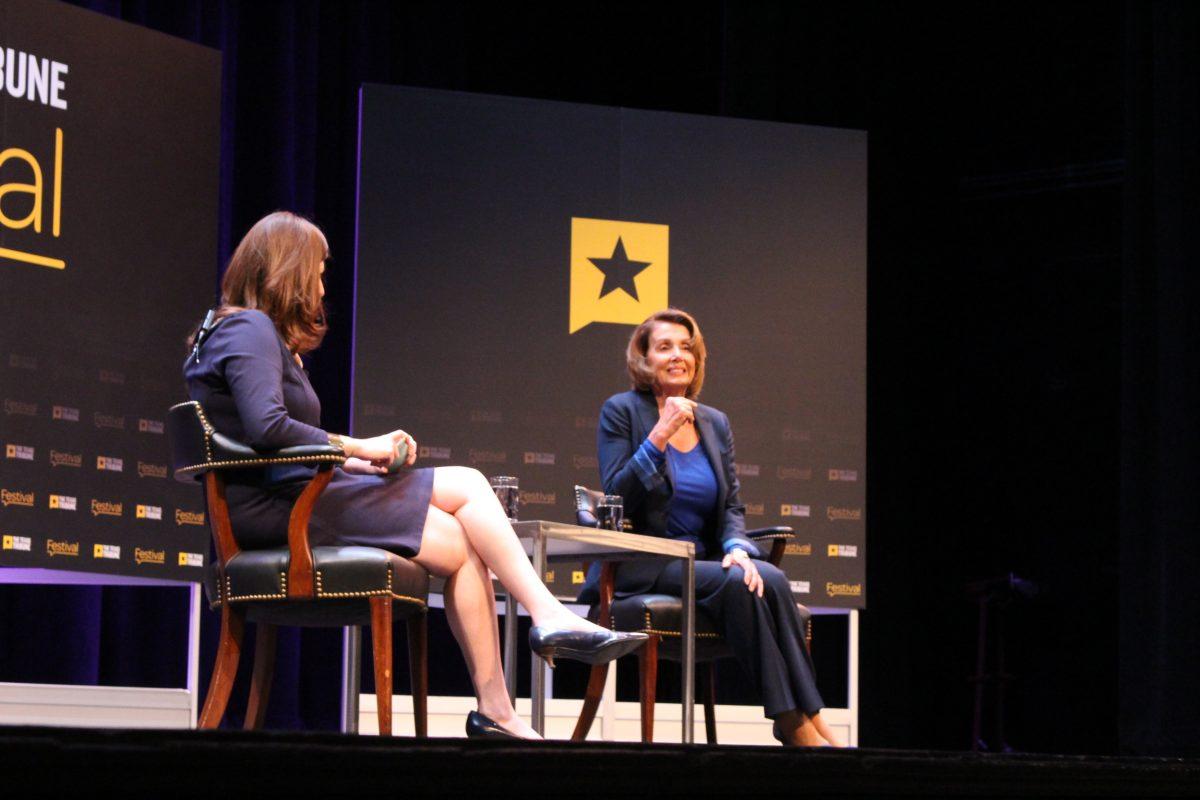U.S House Democratic Leader Nancy Pelosi at Texas Tribune Festival.
The skies were clear and the sun shined brightly during the fifth annual Texas Tribune Festival at the University of Texas at Austin. From Oct. 16 to 18, the festival featured prominent speakers including Lt. Gov. Dan Patrick, House Minority Leader Nancy Pelosi, and Secretary of Housing and Urban Development Julian Castro. By showcasing national and statewide political figures, the event covered issues including immigration, health-care and climate change.
Story by Zoya Zia and Selah Maya Zighelboim
Photos by Selah Maya Zighelboim
In case you didn’t get to attend the festival, here’s a breakdown of some of the biggest events.
One on One with Dan Patrick
Lt. Gov. Dan Patrick, interviewed by Evan Smith, CEO and editor-in-chief of the Texas Tribune, says Texas is headed in the right direction. He pointed to tax cuts and teacher education programs as indicators of success. Patrick did not shy away from his personal beliefs, stressing that America “is a Christian nation,” founded on Christian principles. Smith asked whether, as a Jew, he should feel offended by this statement. Patrick responded by urging conservative principles, especially with the federal government. When asked about gay marriage, he used the analogy of a Jew participating in a neo-Nazi rally to describe a county clerk being forced to issue gay marriage licenses.
Towards the end, the audience challenged Patrick with questions about campus carry, which Patrick strongly advocated for. He says students should feel safer with guns, although some members of the audience were skeptical of this justification for campus carry. “It is important for students to connect to politicians in events like this festival,” undergraduate studies sophomore Christine Joy says. “Most of us are eligible to vote, so I think it is important to get involved in the government and see what differences we can make and how we can voice our opinions.”
Homeland Security Begins at Home
Julian Aguilar, border bureau chief for the Texas Tribune, moderated a debate about immigration between several U.S. representatives including Joaquin Castro (D-TX), Henry Cuellar (D-TX), Blake Farenthold (R-TX), Beto O’Rourke (D-TX) and John Ratcliffe (R-TX). Ratcliffe and Farenthold argued that the influx of undocumented immigrants is much greater now than it was in 2009. Castro contested this by stating there are more border patrol agents and less undocumented immigrants today. Ratcliffe mentioned the murder of a woman in San Francisco, known as a sanctuary city, by an undocumented man. “Unfortunately the statistics show that 1 out of every 5 people coming into this country illegally right now from Mexico have committed aggravated felonies like murder, rape, drug trafficking, those kinds of crimes,” Ratcliffe says during the debate.
“This was rude to the entire Mexican population,” plan II history freshman Shannon Carey says. “This sounded a lot like the racist remarks Trump made.”
O’Rourke, a native El-Pasoan, brought up this same point, indicating Ratcliffe’s lack of sensitivity. “John’s comments about Mexican migrants are I believe a slightly more clever way to restate what Trump has been saying, that Mexican immigrants are rapists, are thugs, are criminals,” O’Rourke says.
Carey supported O’Rourke’s comments. “I liked when Representative Beto O’Rourke said that the immigrants crossing the border are not all criminals, but are people trying to have better lives,” Carey says. “I also like how he mentioned kids and their struggles.” Cuellar argued America is not doing enough to help Latin American countries and is doing a great injustice by viewing Mexico as an enemy, rather than as an ally.
The Fight Over Climate
U.S. representative Lamar Smith and Texas A&M atmospheric science professor Andrew Dessler went head-to-head in this panel on how the U.S. should address climate change. Smith argued that EPA regulations would only improve climate change marginally, and that environmentalists tended to exaggerate climate change. Dessler responded by saying that if the United States addressed climate change, other countries would follow. Dessler also said that climate change projections sound alarming because they are in actuality. “I’ve always been aware of the disconnect between politicians and scientists, but it was interesting to see it personally,” urban studies and economics junior Melissa Flores says.
One-on-one with Nancy Pelosi
When Texas Tribune CEO and Editor-in-Chief Evan Smith came out to introduce Pelosi, he said she was the biggest speaker the festival had ever had. During this one-on-one with Texas Tribune Washington, D.C. Bureau Chief Abby Livingston, Pelosi talked about women in politics, the Citizens United Supreme Court decision and political gridlock in the House. “You can tell she’s thought about issues so deeply, and her personality speaks so much to her as a leader,” government and women and gender studies junior Justin Atkinson says. “I appreciated her touching on public apathy because, without voter engagement, we can’t do anything.”
Although controversial topics sparked inevitable disagreements, there was a consensus on one thing: the positive influence of the festival. Biochemistry sophomore Zeriba Jahangir summarized the vibrant, diverse atmosphere accurately. “There are so many influential speakers that you don’t have access to otherwise,” Jahangir says. “This festival is pretty unique.”












































